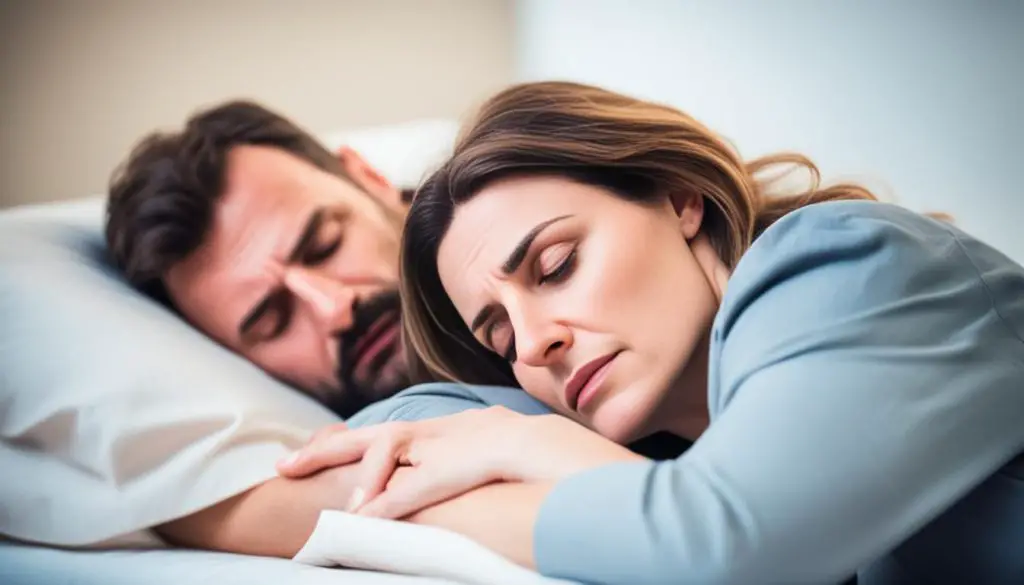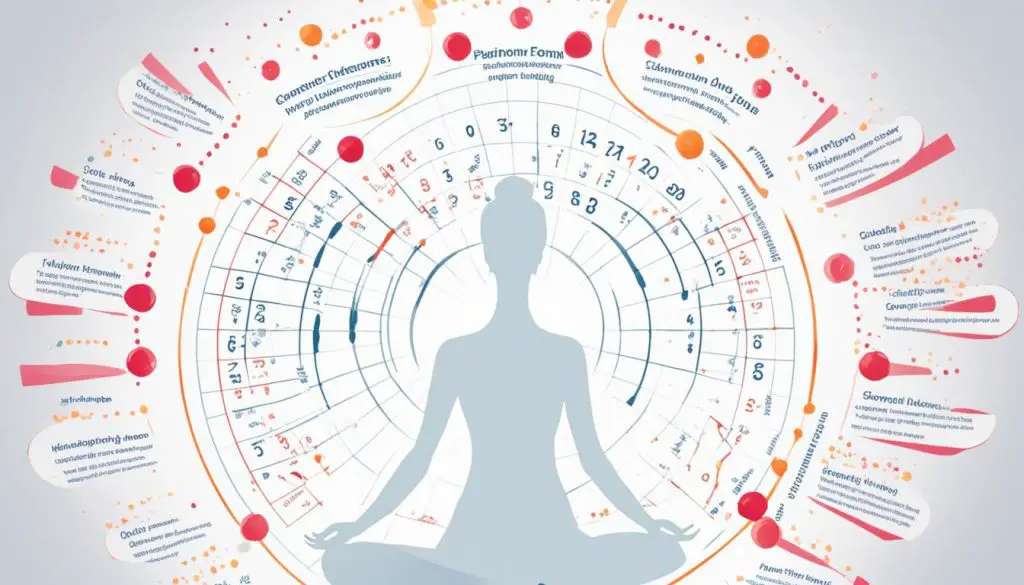Being a husband to someone dealing with endometriosis and fibromyalgia has shown me their struggles. My wife faces painful periods, extreme fatigue, and chronic pain. Yet, we’ve found a glimmer of hope in relaxation and foreplay. These can ease endometriosis symptoms and boost well-being.
Some see relaxation and foreplay as just for fun, not treatment for endometriosis’s pain. But, studies show otherwise. Research has revealed that adding relaxation techniques to daily life can reduce endometriosis pain. It can make us feel better overall. A study in the Journal of Obstetrics and Gynecology discovered that mindfulness, like meditation, eases pain and stress in these patients.
The connection between our mind and body in endometriosis is strong. Stress and anxiety can make pain worse. On the flip side, relaxation can trigger the body’s natural healing. This helps with pain relief. So, making relaxation and mindfulness a daily habit can help take charge of pain and life quality.
Moreover, foreplay is key in handling sexual pain linked to endometriosis. It’s about both the physical and emotional closeness. Foreplay relaxes the pelvic muscles, lowers tension, and boosts arousal. This can make sex less uncomfortable and more satisfying. Prioritizing foreplay and open communication helps couples tackle endometriosis together. They can build a stronger bond and enjoy a rewarding sex life, despite the illness.
Even though these methods don’t cure endometriosis, they are part of a holistic care plan. Relaxation and intimate moments help improve life quality. They give people with endometriosis and their loved ones a sense of control and hope amidst the condition.
The big question is, do relaxation and foreplay really help with endometriosis? Let’s look further into the advantages of relaxation techniques and the strong connection between mind and body in endometriosis. Together, we will discover wellness and mindfulness methods that can reduce suffering and lead to a more satisfying life for those with endometriosis.
The Impact of Endometriosis on Sexual Health
Endometriosis has a big impact on sexual health. It often makes periods and sex painful. This can lead to sexual problems and affect relationships.
People with endometriosis might not want sex because it’s painful and uncomfortable. They might have trouble orgasming or feel tense and anxious about sex.
The effect of endometriosis on sex can be both physical and emotional. It can make people feel upset or distant, causing problems in relationships.
Talking about sex is important when dealing with endometriosis. Talking to your partner and to doctors is key. Also, seeing a sexual health expert can help a lot.
Tips like trying new sex techniques or being more relaxed can make a difference. Remember, everyone’s experience with endometriosis is different. So, finding what works for you is important.
Challenges in Intimate Relationships
Endometriosis can strain close relationships. Both the physical and emotional effects can be tough. It’s crucial for partners to talk openly about the issues they face.
Partners who are there for each other can make a lot of difference. They should offer emotional support and help find solutions. This includes going to medical appointments together.
| Effects of Endometriosis on Sexual Health | Strategies for Improvement |
|---|---|
| Reduced desire for sex | Open communication with partners |
| Difficulty reaching orgasm | Incorporating relaxation and mindfulness practices |
| Physical tension and anxiety before sex | Exploring different techniques and positions |
| Decreased satisfaction with sex life | Seeking support from a healthcare professional |
Focusing on the impacts of endometriosis on sexual health and building strong, understanding relationships can help. It can support intimacy and well-being.
Continue reading: Sexual Health with Endometriosis: Understanding and Overcoming Challenges.
Understanding Dyspareunia in Endometriosis
Dyspareunia means pain during or after sex. It’s a common issue for people with endometriosis. This pain can make sex difficult and lower your quality of life. It’s because endometrial implants cause inflammation and scarring near your pelvic organs. This makes sex hurt more.
To deal with sex pain from endometriosis, you need to focus on both the physical and emotional sides. It’s key to talk openly with health experts to find ways to enjoy sex more. Some ways to help could be with foreplay, using lube, and trying different positions to reduce pain.
It’s also crucial to share honestly with your partner about the pain. Supporting each other emotionally can make your relationship stronger. This understanding can help during tough times.

Managing sexual pain in endometriosis: Tips and Strategies
Here are some useful tips for dealing with sex pain in endometriosis:
- Prioritize foreplay to ensure relaxation and arousal before intercourse.
- Use personal lubricants to reduce friction and discomfort during penetration.
- Try different sexual positions to find ones that minimize pain and maximize pleasure.
- Consider discussing concerns and seeking advice from healthcare professionals specialized in endometriosis.
- Remember that open and honest communication with your partner is paramount in creating a safe and supportive environment.
By taking these steps and being proactive in managing sexual pain, individuals with endometriosis can find ways to prioritize their sexual well-being and maintain a fulfilling intimate life.
| Table: Causes of Pain During Sex in Endometriosis | Symptoms | Possible Causes |
|---|---|---|
| Deep pelvic pain during penetration | Presence of endometrial implants around the pelvic organs | Scarring and inflammation caused by endometriosis |
| Pain during deep thrusting | Adhesion formation | Tethering of pelvic organs due to endometriosis |
| Post-intercourse pelvic pain | Inflammatory response triggered by intercourse | Irritation and inflammation around endometrial implants |
Medication and Surgical Options for Pain Management
When dealing with endometriosis pain, you have many options. Both medicines and surgeries can ease symptoms and offer relief from pain. It’s good to know there are ways to manage the discomfort.
Medication Options
Nonprescription pain relievers like ibuprofen can briefly ease endometriosis pain. These drugs reduce swelling and make you feel better.
Using hormonal treatments is another approach. Things like birth control pills, patches, or hormone IUDs can make hormones more stable. This can lower pain. Also, shots that lower estrogen, called GnRH agonists, can help. They lessen symptoms by reducing estrogen production.
Surgical Options
If pain doesn’t ease with just medicine, surgery could be an option. One operation is excision surgery. It cuts out endometriosis tissue and adhesions. This often provides relief that lasts. The surgery is done with small incisions, like in laparoscopy.
| Medication Options for Endometriosis Pain | Surgical Options for Endometriosis Pain |
|---|---|
| Nonprescription pain relievers (e.g., ibuprofen and naproxen sodium) | Excision surgery |
| Hormonal therapies (e.g., contraceptives, injectable medications) | – |
| – | – |
Always talk to your doctor about your options. They’ll suggest what’s best for you. Personal suggestions are key, tailoring the treatment to your individual situation.
Sometimes, hormone medicine is given to prevent future endometriosis and reduce symptoms. These drugs help balance hormones, which can stop more tissue growth.
By looking into various medicines and surgeries, those with endometriosis can find ways to manage their pain and enjoy life better.
Psychological Support for Intimacy and Fertility Issues
Living with endometriosis is tough, both physically and emotionally. It greatly impacts intimate relationships and fertility, leading to more stress. That’s why getting psychological support is key for those with endometriosis.
Both psychotherapy and sexual counseling are helpful. They help people manage the emotional effects of endometriosis. They let people talk about their feelings and fears in a safe place. This can lead to finding better ways to cope and feeling better overall.
Psychological support also helps with fertility issues. A fertility specialist can offer advice and different treatment options to improve chances of getting pregnant. This advice empowers couples to handle fertility treatments and make wise choices about starting a family.
Studies have shown that psychological support can greatly improve the life of those with endometriosis. It makes people feel better emotionally, strengthens relationships, and helps them face challenges head on.
A study in the Journal of Psychiatric Research found that psychological support decreased anxiety, depression, and stress in people with endometriosis. Another study in the International Journal of Impotence Research showed that couples’ counseling improved relationship happiness and sexual functioning in those affected by endometriosis.
By focusing on psychological support, those with endometriosis can better their emotional health and intimacy. Getting help from mental health experts, couples therapists, and fertility specialists makes a big difference in handling the challenges of endometriosis.
Benefits of Psychological Support in Endometriosis
| Benefits | Explanation |
|---|---|
| Improved emotional well-being | Psychotherapy and counseling offer a place to deal with endometriosis emotions. This can lower anxiety, depression, and stress. |
| Enhanced intimacy | Sexual counseling can aid individuals and couples in working through issues related to intimacy, easing sexual dissatisfaction and pain. |
| Effective coping strategies | Psychological support gives practical tools to manage the emotional impact of endometriosis, leading to better well-being. |
| Increased fertility treatment success | Couples counseling and fertility specialist guidance can support and guide through fertility treatments. This increases the chance of conception. |
Choosing to seek psychological support helps those with endometriosis play a part in their emotional health and fertility journey. Remember, seeking help shows your strength and can truly improve your life with endometriosis.

Pelvic Physical Therapy as a Treatment Option
Pelvic physical therapy offers great help to those battling endometriosis. It focuses on easing pelvic pain and improving pelvic health overall. This therapy uses exercises, hands-on methods, and learning sessions to reduce pain.
It targets pelvic pain through exercises that strengthen and stretch pelvic muscles. This helps cut down on the pain from endometriosis. Special manual techniques aim to relax and release tension from the pelvic area, offering a welcome relief from pain.
This therapy is also about improving body movements and posture to manage pelvic discomfort better. By adjusting pelvic function, it lessens pain and makes daily life and personal connections more comfortable.
Education in self-care and new habits is also a key part. It’s about giving people with endometriosis the tools to help themselves. This learning is essential for managing daily pelvic pain.
Benefits of Pelvic Physical Therapy:
- Reduces pelvic pain in endometriosis
- Improves pelvic alignment and mobility
- Strengthens and stretches pelvic muscles
- Enhances overall pelvic health
- Empowers individuals to manage their symptoms
Considering pelvic physical therapy is crucial for those with endometriosis. Working with a skilled therapist can reduce pain, take back control of pelvic health, and enhance overall wellness.
Recent research highlights the therapy’s ability to lower pelvic pain and boost life quality in those with endometriosis. This underlines its effectiveness and value in treatment.
Tips for Enhancing Intimacy with Endometriosis
Endometriosis can make staying intimate a challenge. But with clear communication and the right approach, intimacy can thrive. Here are tips for improving intimacy while living with endometriosis:
1. Prioritize open and honest communication
Talk openly about how endometriosis affects your sex life. This includes any discomfort or pain. Sharing concerns and dreams helps both partners understand and meet each other’s needs. Together, you can find ways to be intimate that are both enjoyable and comfortable.
2. Explore alternative forms of intimacy
Remember, intimacy isn’t just about intercourse. You can connect in many ways, like cuddling or having quiet time together. Finding and enjoying other ways to be close keeps your bond strong, even if sex is difficult.
3. Try different positions
Not all sexual positions have to cause pain. Try new positions with your partner that might be more comfortable. Figure out what feels good for both of you. Pleasure and closeness can come from many different sources.
4. Don’t forget about foreplay
Foreplay is key before sex, especially for reducing pain and discomfort. Include activities like sensual massages and kissing to get ready for intercourse. It can make sex more enjoyable and help with any discomfort.
5. Seek professional guidance if needed
If pain affects your sex life, talking to a healthcare professional can help. They can offer advice and treatments designed to ease symptoms. Remember, professional help can make a big difference in sexual health.

6. Prioritize self-care and well-being
Self-care goes beyond the physical. It means managing stress, taking time for yourself, and doing things that make you happy. This can improve your sexual health and overall well-being.
7. Educate yourself and your partner
Knowing more about endometriosis can bring you closer. Learn about the condition together. This knowledge can lead to better patience, understanding, and support. Educate yourself to support your partner better.
Improving intimacy with endometriosis takes work and dedication from both partners. By following these tips, you can strengthen your relationship and have a fulfilling sex life, despite the challenges.
Tracking Symptoms and Timing for Pain Management
Managing endometriosis pain well means tracking symptoms and when the pain happens. By knowing when and how much pain, people with endometriosis can create their own pain control plans.
Data Collection: Tracking Endometriosis Symptoms
To find out what causes your pain and when it gets worse, you need to track your symptoms. You can use apps or calendars to note down your pain, how long it lasts, and any other feelings like bloating or being tired. Keeping this info updated helps to see your pain patterns over time.
Menstrual Cycle Tracking
The menstrual cycle affects endometriosis symptoms greatly. By keeping track, you can see how your pain changes during your cycle. Use apps or calendars to note your period’s start and end dates, and any pain symptoms you have. This helps to see pain patterns and plan your activities better.
Pain Management Strategies
Knowing when your pain is helps you use better pain management methods. Pain relievers can help but talk to your doctor about what medicines might work best for you. Think about trying other ways to manage pain, like using heat, gentle exercise, or relaxation.

Table: Pain Management Strategies for Endometriosis
| Strategy | Description |
|---|---|
| Medication | Prescription and over-the-counter pain relievers |
| Heat therapy | Applying heat packs or taking warm baths to alleviate pain |
| Exercise | Gentle exercises like yoga or walking to reduce pain and improve overall well-being |
| Relaxation techniques | Practicing techniques like deep breathing, guided imagery, or meditation to reduce pain and promote relaxation |
| Dietary modifications | Exploring anti-inflammatory foods and avoiding triggers like caffeine and processed foods |
Using these strategies while tracking your symptoms can mean better pain control. It also helps you make smart choices about your daily life, including sex.
Communicating with Partners About Endometriosis
Talking openly and honestly is key in dealing with endometriosis. It helps those with endometriosis as they figure things out. Plus, it makes relationships stronger. Good communication means explaining the condition and talking about symptoms. It also means sharing your emotional and physical needs. This creates a base of support and understanding. It’s vital for handling how endometriosis affects your relationship.
When it comes to talking to partners about endometriosis, here are some points to remember:
- Explain the condition: Share what endometriosis is and how it affects you. Help your partner understand by educating them. This builds awareness and empathy.
- Discuss symptoms: Be open about the symptoms you go through. Talk about pain, fatigue, and mood changes. This helps your partner see what living with endometriosis is really like and encourages empathy.
- Express emotional and physical needs: Tell your partner clearly what you need. Let them know how endometriosis affects your emotional health and quality of life. This conversation lets your partner offer the support you require.
Remember, both of you need to communicate well. Encourage your partner to ask questions and share their feelings. This openness can strengthen your relationship. It ensures both of you feel supported through this journey.
Tips for Communicating with Partners About Endometriosis
| Tip | Description |
|---|---|
| 1 | Choose the right time and place to have the conversation |
| 2 | Be open and honest about your experiences and feelings |
| 3 | Listen actively to your partner’s thoughts and concerns |
| 4 | Encourage questions and provide accurate information |
| 5 | Express your needs and expectations for support |
| 6 | Work together to find ways to manage the impact of endometriosis on your relationship |
By talking clearly with your partner about endometriosis, you can build a strong support team. Remember, you’re not alone in facing endometriosis. Togetherness helps you both find ways to lessen its effect on your relationship. This way, you can keep making a happy life together.
Lifestyle and Wellness Strategies for Endometriosis
Looking at endometriosis holistically can really help you feel better. Adding lifestyle and wellness things to your daily life makes a big difference. It helps with symptoms and makes life more enjoyable.
Managing Stress in Endometriosis
Stress makes endometriosis worse and harms your health. To lower stress, try things like deep breathing or meditation. Taking breaks to do something fun, like reading or being outside, also helps a lot.
Coping with Endometriosis Symptoms
Endometriosis affects people in different ways. But eating right and staying active can often ease symptoms. Try to include foods that fight inflammation in your diet. Also, find exercises like yoga that won’t stress your body too much.
Wellness Practices for Endometriosis
Wellness is key for dealing with endometriosis. Mindfulness, like meditation, helps you and your body work together. Doing things that make you happy and relaxed is also vital for well-being.
Seeking Support
Endometriosis can be a lot to handle. It’s vital to get support from others who get it. Joining groups online or talking to a counselor can really help. They offer insights and help with the tough emotions endometriosis can bring.
Trying out these strategies can make a real difference. They empower you to take control of your endometriosis and feel better overall.
Learn more about chronic pelvic pain and its effect on women’s health.
The Mind-Body Connection in Endometriosis
Endometriosis affects both someone’s body and mind. It’s important to understand this link. This helps in handling the tough emotions that come with the condition.
Living with endometriosis is hard. It means coping with chronic pain and worries about having children. It can also affect daily life. This leads to feelings like frustration, anxiety, and sadness. It can also lower your quality of life.
To deal with these emotions, a broad strategy is key. This includes self-care, cutting down on stress, and getting help from others. People with endometriosis should make their mental health a priority.
The connection between our thoughts, feelings, and our bodies is strong. Stress can make endometriosis worse. But, taking care of your mind and emotions can help your physical health too.
Some self-care tips include practicing mindfulness and relaxation. Doing things you love, like yoga or spending time outside, can reduce stress and make you feel better.
Getting emotional support is also crucial. You can talk to healthcare providers, join support groups, or meet people online who understand. This can make you feel less alone. It can also be a safe space to talk about your struggles.
The mental toll of endometriosis is huge. It’s vital to address both the physical and mental sides of the condition. This helps those with endometriosis lead a better life.
You can learn more about the emotional impact of endometriosis by reading this informative article.
Addressing Fertility Issues in Endometriosis
Endometriosis can make having a baby tough. It affects fertility in complex ways. Specialized help is needed to overcome these challenges. Seeking expert advice and support is crucial.
Fertility challenges in endometriosis:
It’s hard for many with endometriosis to conceive. Adhesions can block tubes, affecting fertilization. Endometriosis can also hurt egg quality and ovulation.
Treating infertility in endometriosis:
Various treatments help endometriosis-related infertility. These include hormones, IVF, and surgeries. The right option depends on your condition and need. A fertility expert can guide you.
Support for couples with endometriosis:
Infertility affects both partners deeply. Seeking support is key. Support groups, counseling, and online communities offer solace. Talking, getting help, and focusing on well-being help cope with this stress.
Remember your self-worth isn’t tied to your fertility. Treatment and support empower those who wish to become parents. Facing fertility challenges with the right help increases the odds of reaching your parenting dreams.
Treatment Options for Infertility in Endometriosis
| Treatment Option | Description |
|---|---|
| Hormonal Therapies | These therapies aim to curb endometriosis and better fertility by managing the cycle and reducing inflammation. |
| Assisted Reproductive Technologies (ART) | IVF and similar procedures help those with endometriosis get pregnant by working around tube blockages. |
| Surgery | Surgeries can remove endometriosis or improve the pelvis, boosting your chance to conceive. |
| Combined Approaches | For complex cases, doctors might suggest combining hormonal treatments, ART, and surgery. |
Emotional Support for Individuals with Endometriosis
Living with endometriosis can be tough emotionally. People might feel frustrated, sad, or anxious. It’s important to have a strong support system. This helps in facing these emotional struggles and feeling empowered and understood.
The Importance of Emotional Support
Emotional support is key for those with endometriosis. It gives a place to share feelings, seek advice, and get comfort. Knowing others feel the same can have a big impact on well-being and coping.
Resources for Emotional Support
There are many places to find emotional help for endometriosis:
- Support groups: Join to meet others who understand and offer support.
- Online communities: Websites and forums give a global network of support and advice.
- Mental health professionals: Therapists and counselors who know about chronic illness or women’s health can provide helpful advice just for you.
These resources can make individuals feel supported and less alone. They help fight off isolation and show that our feelings matter.
| Emotional Support Resources | Description |
|---|---|
| Support Groups | Connect with others who understand your struggles and provide valuable emotional support. |
| Online Communities | Join virtual communities to share experiences, seek advice, and find global support. |
| Mental Health Professionals | Consult with professionals for personalized support and coping strategies. |
Self-Care and Empowerment
Self-care is crucial for emotional health. Relaxing activities like meditation, journaling, or hobbies can bring peace. It’s important to prioritize self-care and set boundaries to reduce stress.
Remember, you’re not alone if you have endometriosis. Seeking support, finding coping methods, and caring for yourself can help handle the emotional side. This can lead to a life where you feel more powerful and satisfied.
Conclusion: Empowering Individuals with Endometriosis
Living with endometriosis can be tough, but you’re not fighting alone. It’s vital to boost yourself by practicing self-care and being proactive about your health. This will help you take control of your well-being.
Self-care is crucial. Make time for things that make you happy and help you relax. This can include hobbies, mindfulness, or being in nature. Remember, self-care is important in dealing with endometriosis daily.
It’s also important to talk openly about your struggles. Share with family, friends, and doctors your experiences and fears. This can bring the support and understanding you need. Joining support groups or online forums can also help you feel less alone.
Believe in your power to face endometriosis’ challenges. Keep a positive attitude and confidence in yourself. With the right support and mindset, you can lead a happy life. You can keep strong relationships and manage endometriosis well.
